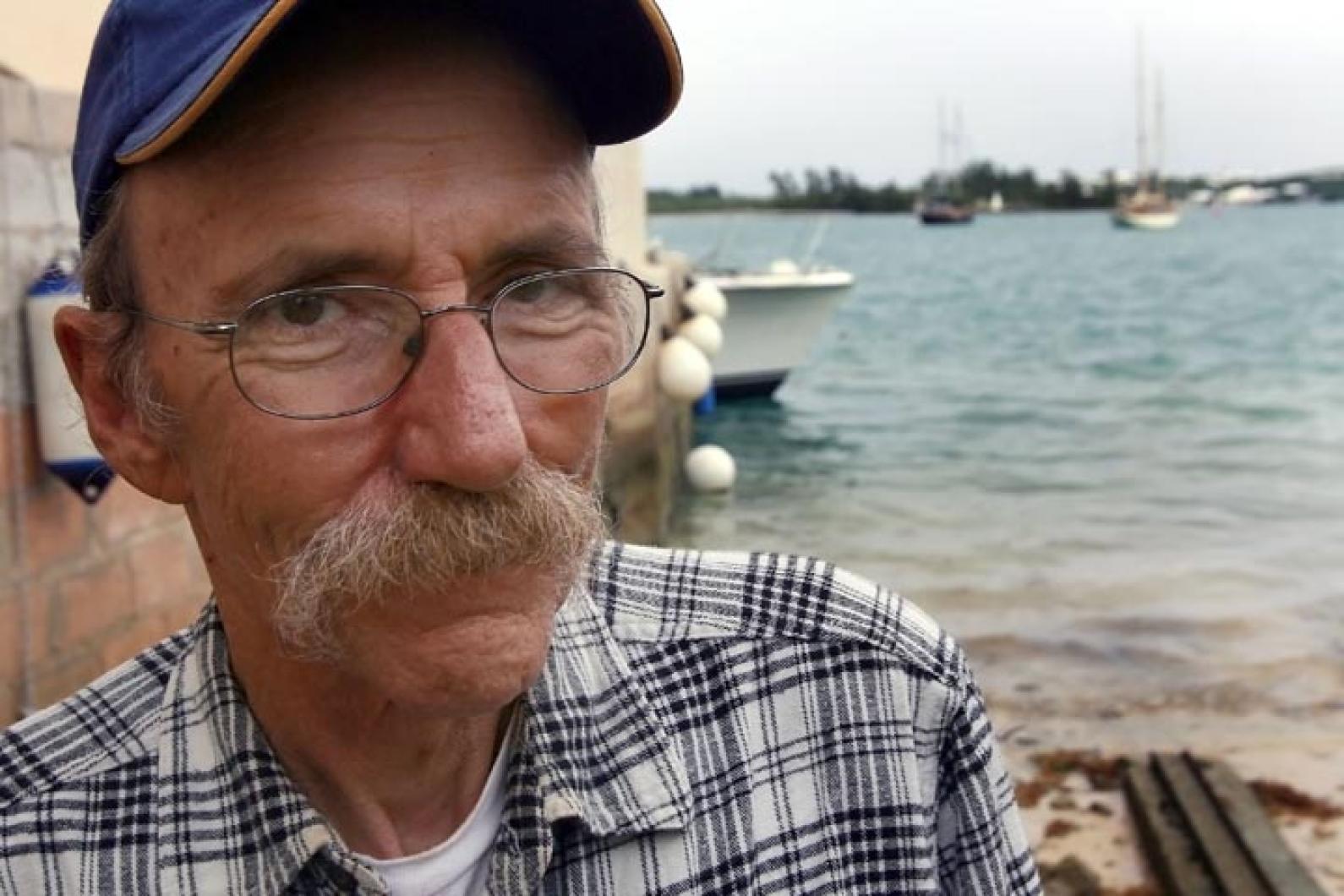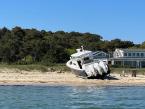A three-man sail from Vineyard waters earlier this month ended in tragedy; a loss of a sailor’s life, a dismasting of a two-masted sailboat which was later abandoned, and a dramatic rescue of two in the high seas.
Captain Dennis White, 63, of the 41-foot ketch Emma Goldman, had left the Vineyard on Saturday, Nov. 6 with a crew of two: the captain’s longtime friend William (Willie) Thorns, 64, of Mashpee and his 25-year-old daughter, Amanda Thorns.
On Sunday, Captain White and Amanda Thorns were rescued from the foundering sailboat after 12 days, about 218 miles northwest of Bermuda by a passing Greek 900-foot oil tanker.
The two survivors brought with them a harrowing tale of the loss of Amanda Thorns’s father after the dismasting and of their own struggle to stay alive. After their rescue from the deck of the sailboat, the boat was abandoned.
It was a confluence of awful weather, tall seas and bad luck.
“I am really happy to be with my loved one,” Mr. White said on Wednesday, soon after he was picked up by his wife, Julie Robinson, at Logan Airport, adding:
“I have a hole in my heart. I lost my best friend.”
The captain’s goal had been to sail the ocean-equipped sailboat to the Virgin Islands, or at the very least Bermuda, depending on the weather, according to his wife, who spoke to the Gazette from her West Tisbury home on Tuesday. He had done the sail to the Caribbean several times before.
Ms. Robinson said she only heard about the tragedy that befell the Emma Goldman on Sunday, when she got a telephone call from her husband aboard the oil tanker saying that he and Amanda Thorns had just been rescued.
Prior to leaving, Ms. Robinson said: “Dennis had said to me that they were going to head to the Virgin Islands. He said, if you don’t hear from me in five days [how long it would take to get to Bermuda], I would hear from him in 14 days. ‘If you don’t hear from me, don’t call the Coast Guard, we will be all right and arrive Monday and Tuesday,’ he said.”
But through conversations on the phone, Ms. Robinson learned about what happened.
They had left Lake Tashmoo on Saturday, Nov. 6. They sailed to Tarpaulin Cove. “They left after midnight,” she said.
“I had a six-day weather forecast that said northwest winds all the way to Bermuda,” the captain said. He was unaware that a weather system was forming in the Gulf of Maine that was far bigger than any forecast he had seen.
The weather deteriorated. “I was sucked into the Gulf Steam by the current,” Mr. White said. “My plan was to take it.”
Somewhere 350 miles south of the Vineyard they were in the midst of huge seas, gale force northeast winds. She said the vessel encountered 30 to 40 foot waves.
Ms. Robinson said at one moment, at night, while Mr. Thorns was on deck on watch, with a lifeline connecting him to the boat, and Miss Thorns and the captain were below, the vessel rolled over in a swell.
“While Will was on watch, the boat rolled over 360 degrees. When it came up, the masts were gone, everything was washed off. Willie was washed off, caught up in the rigging that was dragging behind the boat.”
Mr. Thorns was still alive at the time.
“In 30 to 40 foot waves, they were unable to pull Willie back up into the boat. He was tangled in the wires,” Ms. Robinson said.
“It was very cold,” the captain said.
In high seas, the sailor died.
For the next three days, all the two could do was stay alive and below and bail.
“There was a hole on deck, left by the mizzen.
“After three days they were able to go on deck and cut loose all the wires and the debris,” she said.
Without a mast, there was no antenna, no way to communicate a distress call by radio. The engine didn’t work. A portable marine radio was hidden below.
“I didn’t have an EPIRB,” the captain told the Gazette. “If I had, I would have been rescued. Instead, it took 12 days to be rescued.” EPIRB is a transmitting device that calls for help through satellites.
After three days of bailing the boat out, the captain said he found the handheld marine VHF radio, with still enough battery power to be used. “Found it in the bilge, it had been underwater for three days, and it had about a half a charge in the battery,” the captain said.
When the weather had improved, the captain was able to rig up a sail using the mast from their sailing dinghy. “He jury-rigged a small sail and they were able to do about two knots for two days,” Ms. Robinson said. But they could only sail in one direction. The captain said they did 55 miles in two days.
On more than one occasion they tried to hail a passing freighter but weren’t noticed. Mr. White said they saw their first ship, only about four miles away. But it didn’t see them, though they sent up flares.
“The second ship was three miles away and they missed us,” the captain said.
“I kept figuring if we could sail farther south, I would see more tankers. All I wanted to do was get rescued. I was running out of water, the boat was falling apart. I saw one ship one day. I saw another the next day,” the captain said.
Ms. Robinson said: “Twelve days [into their troubles, a ship was seen.] They sent up a flare and were picked up by a Greek ship, but it took all day for the ship to come along because the water was so rough,” Ms. Robinson said. The ship was the Triathlon. The two survivors arrived in Bermuda on Monday morning.
The huge ocean storm that gave the Vineyard and southern New England a week of awful weather originally formed in the Gulf of Maine, according to Kevin Sadima, a meteorologist for the National Weather Service in Taunton. “It was gusty for three days,” he said. The storm brought the first snowfall to parts of Cape Cod. But what was even more unusual was its persistence in staying over the ocean south of Martha’s Vineyard for so long.
“Our offshore buoys, one at Nantucket Shoal, recorded 20 to 25 foot seas,” Mr. Sadima said. The gale was blocked from moving.
William (Willie) Thorns was an avid sailor. Just last month, he had sailed his Herreshoff 28-foot wooden sailboat, called Dog Star, from Lake Tashmoo to Cotuit. He was a familiar face on the Cape and Vineyard waterfront.
Bill McKay, who also lives in Mashpee, said his friend loved wooden vessels and the two had met 19 years ago, when Mr. McKay had just acquired a wooden catboat. “When he heard another wooden boat was in town, he rambled down to inspect my boat,” Mr. McKay said. “We became friends.
“He was an avid sailor and used to sail in bad weather. I talked to him a month ago, he had just come back from the Vineyard in a real blow,” Mr. McKay said. “He was a master finish carpenter,” he said.
Ms. Robinson said her husband had been friends with Mr. Thorns for upwards of 25 years. Both were finish carpenters and shared a love for boats. Though Mr. Thorns had never done an ocean crossing, he was anxious to help his friend on this big trip.
Ms. Robinson said her husband thought hard about taking the two Thorns on the sail. Earlier this year, Mr. White had suffered a serious hand injury. He lost a finger to a table saw injury and was recovering. “Basically, he is permanently disabled in his right hand,” Ms. Robinson said.
“Dennis wouldn’t take Amanda by herself, so he gave Willie the opportunity to go. Will had no experience at ocean going. Willie was doing what he really wanted to do. He wanted to go on this trip badly.”
When the sailboat was adrift in the hard seas, Amanda and Dennis kept each other going, Ms. Robinson said she had learned. “I know that kind of experience,” she said. “You are too busy surviving.”
“We once got knocked down in Bermuda. I can picture pretty clearly in my mind what they went through,” Ms. Robinson said. “Dennis is cool and calm under pressure.”
Mr. White returned to New England on Wednesday.
Soon after arriving in Bermuda, Miss Thorns left for San Francisco to be with her boyfriend, Ms. Robinson said.
The sailboat Emma Goldman was built in six years in the family’s backyard in West Tisbury and completed in 1992. She was a cold-molded, cedar plank, wood and epoxy hull. Years before, she said, “We had sailed around the world in a modified H-28, and it took eight years.”
The couple took their two children, Sasha, now 29, and Josh, now 26, down for winter sailing around Bermuda in 1992. “We left for the Caribbean right after that and home-schooled them on the boat,” she said. The couple had logged 25,000 miles, including five trips from the Vineyard to Barbados, in that boat.
Both Mr. White and Ms. Robinson were avid sailors well before they met. They moved to the Vineyard, she said, “to build a bigger boat.” She said she had learned to sail as a youngster at the Vineyard Haven Yacht Club, though she grew up in White Plains.
The ketch Emma Goldman was named after a distinguished woman, an anarchist, a woman who struggled for better labor laws, child labor laws, in the early 1900s. “She was a heroine of ours,” Ms. Robinson said. People would ask what the name was for, Ms. Robinson said, and it started a political conversation.
Ms. Robinson said she and her husband and friends are now mourning the loss of a dear friend: “Boats are replaceable. It is Willie that is not replaceable.”
The captain and his wife planned to spend Thanksgiving yesterday with family in Connecticut.






Comments (10)
Comments
Comment policy »